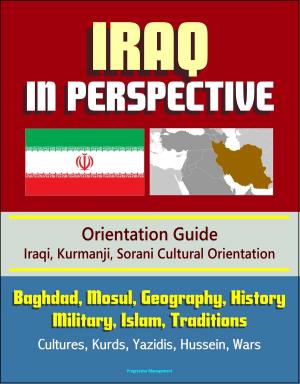Jihadi Discourse in the Wake of the Arab Spring: Islamic Militancy, Terrorism, Tunisia, Egypt, Libya, Mubarak, Syria, ISIS, ISIL, Muslim Leaders, Salafis, Jihadism, Osama Bin Ladin
Nonfiction, History, Middle East, Social & Cultural Studies, Political Science| Author: | Progressive Management | ISBN: | 9781310294914 |
| Publisher: | Progressive Management | Publication: | February 4, 2016 |
| Imprint: | Smashwords Edition | Language: | English |
| Author: | Progressive Management |
| ISBN: | 9781310294914 |
| Publisher: | Progressive Management |
| Publication: | February 4, 2016 |
| Imprint: | Smashwords Edition |
| Language: | English |
Professionally converted for accurate flowing-text e-book format reproduction, this report analyzes jihadi discourse in the wake of the "Arab Spring" in order to address two related questions: (1) why have global jihadi leaders been struggling to advance a coherent and effective response to the events of the Arab Spring, and (2) why, despite strong rhetoric of militancy, have we witnessed little action on the part of new jihadi groups that have emerged in countries that underwent regime change (i.e., Tunisia, Egypt and Libya) as a result of the Arab Spring? To answer these questions, this study focuses on original Arabic sources in the form of public statements released by global jihadi leaders in response to the Arab Spring and by new groups projecting a jihadi worldview that have emerged in Tunisia, Egypt and Libya. Regional jihadi groups that were established prior to the Arab Spring are not the focus of this study. This study reveals that global jihadi leaders are struggling to define clearly and consistently their ideological framework in the aftermath of the Arab Spring. More precisely, the factors that are causing the current ideological incoherence of jihadism are the same factors that had once served as the cornerstone of its plausibility in the eyes of its adherents.
This study identifies several weaknesses in the discourse of global jihadi leaders that highlight the nature of the challenges they face in the wake of the Arab Spring. These include the paradoxical position of the deed of spectating: the jihadis have always prided themselves on action, i.e., on the deed of jihad; and in so doing, they gained the attention of the world community. Yet, in the initial phase of the Arab Spring, the jihadis found themselves not as actors in, but as spectators of the drama of fallen dictators. Another related challenge is the once powerful grievance narrative that "jihad is the only solution" to rid Muslims of their dictators that jihadi leaders and ideologues had propagated. This narrative, however, is shaken in the wake of the Arab Spring as non-violent protest toppled some iconic dictators like Husni Mubarak of Egypt and Zein al-'Abidin bin 'Ali of Tunisia. The most glaring weakness of current jihadi discourse has to do with the fact that after the fall of dictators, people have chosen a political path that is irreconcilable with the jihadi worldview and have become the object of jihadi resentment. Thus the jihadis' once-powerful grievances articulated against dictators are now reduced to soliloquies criticizing the people.
Professionally converted for accurate flowing-text e-book format reproduction, this report analyzes jihadi discourse in the wake of the "Arab Spring" in order to address two related questions: (1) why have global jihadi leaders been struggling to advance a coherent and effective response to the events of the Arab Spring, and (2) why, despite strong rhetoric of militancy, have we witnessed little action on the part of new jihadi groups that have emerged in countries that underwent regime change (i.e., Tunisia, Egypt and Libya) as a result of the Arab Spring? To answer these questions, this study focuses on original Arabic sources in the form of public statements released by global jihadi leaders in response to the Arab Spring and by new groups projecting a jihadi worldview that have emerged in Tunisia, Egypt and Libya. Regional jihadi groups that were established prior to the Arab Spring are not the focus of this study. This study reveals that global jihadi leaders are struggling to define clearly and consistently their ideological framework in the aftermath of the Arab Spring. More precisely, the factors that are causing the current ideological incoherence of jihadism are the same factors that had once served as the cornerstone of its plausibility in the eyes of its adherents.
This study identifies several weaknesses in the discourse of global jihadi leaders that highlight the nature of the challenges they face in the wake of the Arab Spring. These include the paradoxical position of the deed of spectating: the jihadis have always prided themselves on action, i.e., on the deed of jihad; and in so doing, they gained the attention of the world community. Yet, in the initial phase of the Arab Spring, the jihadis found themselves not as actors in, but as spectators of the drama of fallen dictators. Another related challenge is the once powerful grievance narrative that "jihad is the only solution" to rid Muslims of their dictators that jihadi leaders and ideologues had propagated. This narrative, however, is shaken in the wake of the Arab Spring as non-violent protest toppled some iconic dictators like Husni Mubarak of Egypt and Zein al-'Abidin bin 'Ali of Tunisia. The most glaring weakness of current jihadi discourse has to do with the fact that after the fall of dictators, people have chosen a political path that is irreconcilable with the jihadi worldview and have become the object of jihadi resentment. Thus the jihadis' once-powerful grievances articulated against dictators are now reduced to soliloquies criticizing the people.















